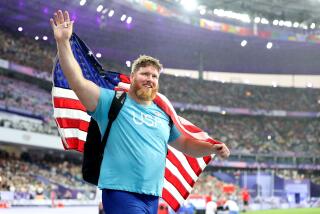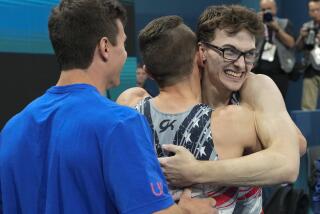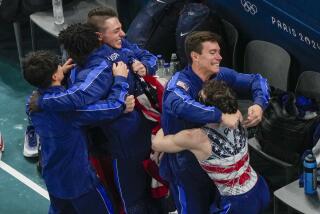Big Win for Team Kersee : Track and field: Jackie Joyner-Kersee uses her coach’s advice for a 23-2 3/4 long jump. Bell clears 18-10 in the pole vault.
- Share via
During a lull in the women’s long jump competition at the USA/Mobil National Track and Field Championships, Jackie Joyner-Kersee went over to the railing that separates the track from the stands to talk to Bob Kersee, her husband/coach.
“He said I had to concentrate on pushing through my marks, accelerating, lifting and holding my extension,” Joyner-Kersee said.
Joyner-Kersee followed his advice on her next jump and leaped 23 feet 2 3/4 inches to win Saturday at Cerritos College. Joyner-Kersee’s jump was the best by an American this year and the second best jump in the world this year. Only Inessa Kravetz of the Soviet Union has jumped farther (23-3 1/2).
“I’m was very pleased with the distance, but I wasn’t pleased with my mechanics,” she said. “I think it came because the run was OK, but I was able to ride the jump and hold my extension longer.”
Joyner-Kersee’s jump was extraordinary considering that she jumped into a headwind of 2.6 meters per second. She had passed once before her winning jump because of the wind.
Sheila Echols, who finished second with a leap of 22-2 1/4, was impressed with Joyner-Kersee’s winning jump.
“I thought that was incredible into that wind,” Echols said. “You have to put the wind aside because if you think about it, it will take you out of what you came to do. I heard a lot of girls complaining about it, but we have no control over that. I was just hoping it would cease when I got ready to jump.”
A former world record-holder in the long jump, Joyner-Kersee said she would like to regain the world mark, which is held by Galina Chistyakova of the Soviet Union at 24-8 1/4.
“I really love the long jump and that’s my best event,” she said. “I’ve learned that I really don’t have to concentrate on going after the world record for the long jump because if I prepare myself, then I believe it will come. There have been times when I really thought I was in shape and tried to go after it, and I put too much pressure on myself and ended up not jumping well at all.”
Kersee said Joyner-Kersee is capable of surpassing her world heptathlon record of 7,291 points at the Goodwill Games next month in Seattle. The Goodwill Games organizers have offered incentives of $15,000 to anyone who sets a world record there.
“I think it’s realistic to expect a world record at the Goodwill Games,” Kersee said. “I looked at it last night and, I’m going to go ahead and shout it out right now because I’m the husband around here: I figure her at 7,299 to 7,312 points.
“But Jackie and I have never gone after world records for money. We go after world records because we want to accomplish something that is difficult. And if we set a world record, the money isn’t going to be the incentive. We’re going to keep chasing world records until it’s time to retire and start working on a couple other little Bob Kersees and Jackie Joyner-Kersees.”
Michael Johnson of Baylor, the NCAA champion at 200 meters, blew away the field in that event, winning in 19.90, the fastest time in the world this year. It was the fifth fastest time ever by an American, and it ranks seventh on the all-time world list.
“I felt like I ran the curve real well, but I usually run the curve well,” Johnson said. “The past few races I’ve had trouble focusing on the finish line coming down the straight, but today it felt real smooth coming down the straight and I think that was the key to the performance I turned in today.”
Was he surprised by his time?
“No,” he said. “I felt the times I’ve run the past couple weeks would bring me to a good time about this time of the year.”
Danny Everett finished second with a personal best of 20.08.
Earl Bell, 34, became a three-decade winner in the national championships, taking the pole vault at 18-10.
Bell, a three-time Olympian and a Games’ bronze medalist in 1984, won his first national title in 1976 and his second in 1984, when he became the first American to clear 19 feet.
Saturday night, after clinching the title, he missed three times at a meet-record 19-0 3/4.
In the biggest upset on the final day of national championships, Janeene Vickers of UCLA held off American record-holder Sandra Farmer-Patrick to win the women’s 400-meter hurdles in 54.80 seconds.
David Patrick, Farmer-Patrick’s husband, came from behind to win the men’s 400-meter hurdles for the second consecutive year in 48.79. He passed Kevin Young (49.56), a former UCLA star, and USC’s George Porter (49.77) in the stretch and held them off at the finish line.
UCLA’s Steve Lewis, the 1988 Olympic gold medalist in the 400 meters, won the 400 in 44.75 and Maicel Malone won the women’s 400 in 51.23.
Mark Everett, who won the NCAA 800-meter title earlier this month while at Florida, came from behind to win the 800 in 1:45.01. Fourth with 300 meters to go, Everett made his move on the final turn, passing leader Octavius Clark in the final straightaway to win his second national title in the past three years.
“I know I’m a bit of a crowd-pleaser because of the way I run (from behind),” Everett said. “The crowd can never tell whether I’m going to make it or not.”
After clearing 6-5 to win the women’s high jump, Yolanda Henry had the bar raised to 6-8 1/4, which would have surpassed Louise Ritter’s American record of 6-8 set in 1988. Although Henry was close on all three jumps, she failed to break the record.
“It made me confident that I can get the record some time soon,” she said. “I’m in shock right now. I started jumping terribly, but after I cleared 6-4 on my first jump, I felt better. But I’m surprised that I won because of the way I started jumping today.”
Track Notes
Mary Slaney, U.S. record-holder in the women’s 1,500, didn’t run the 1,500 final after qualifying for it on Friday. Slaney, however, hopes to be named to compete in the Goodwill Games. . . . Ken Flax, who won the hammer with a throw of 249-6, was nervous before the meet. “I was real careful driving here this morning on the freeway,” Flax said. “Then when I got into the stadium parking lot, I sped up, passed a stop sign and got pulled over by two big cops. I blamed it on pre-meet nerves.” Flax doesn’t have a coach. “But at the end of the second year of coaching myself, I feel totally self-sufficient. I had contractors build a ring in a vacant lot north of San Francisco and I work by myself.”
More to Read
Go beyond the scoreboard
Get the latest on L.A.'s teams in the daily Sports Report newsletter.
You may occasionally receive promotional content from the Los Angeles Times.






